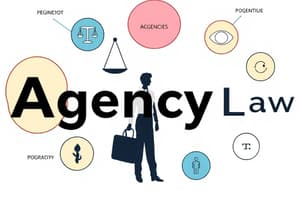Podcast
Questions and Answers
What is the primary role of an agent in an agency relationship?
What is the primary role of an agent in an agency relationship?
- To act on behalf of the principal in dealings with third parties (correct)
- To ensure all parties sign the contract
- To make decisions independently of the principal
- To represent both parties in the transaction
Which of the following best describes a general agent?
Which of the following best describes a general agent?
- An agent with authority limited to their personal capacity
- An agent acting within their ordinary course of business (correct)
- An agent appointed for a specific transaction
- An agent who acts outside of their ordinary course of business
In the context of agency, what distinguishes a special agent from a general agent?
In the context of agency, what distinguishes a special agent from a general agent?
- A special agent is appointed for a specific transaction (correct)
- A special agent always has broader authority
- A special agent can never act on behalf of a principal
- A special agent must operate as a middleman in transactions
What is one key factor that determines whether an agent can act in their own name?
What is one key factor that determines whether an agent can act in their own name?
What happens in a typical agency transaction between an agent and a third party?
What happens in a typical agency transaction between an agent and a third party?
What characterizes a disclosed agency?
What characterizes a disclosed agency?
In an undisclosed agency, which statement is true?
In an undisclosed agency, which statement is true?
What can happen if a principal in an undisclosed agency is discovered by the third party?
What can happen if a principal in an undisclosed agency is discovered by the third party?
Which of the following statements about agents in a disclosed agency is correct?
Which of the following statements about agents in a disclosed agency is correct?
What is a key difference between disclosed and undisclosed agency regarding agent's liability?
What is a key difference between disclosed and undisclosed agency regarding agent's liability?
Which of the following is true regarding the agent's role in an undisclosed agency?
Which of the following is true regarding the agent's role in an undisclosed agency?
What happens if the agent in an undisclosed agency concludes a contract?
What happens if the agent in an undisclosed agency concludes a contract?
In which legal systems is the concept of undisclosed agency generally not recognized?
In which legal systems is the concept of undisclosed agency generally not recognized?
What happens if an agent withholds information that prevents a principal from giving fully informed consent?
What happens if an agent withholds information that prevents a principal from giving fully informed consent?
Under the Unfair Contract Terms Act 1977, which of the following duties can a principal not exclude?
Under the Unfair Contract Terms Act 1977, which of the following duties can a principal not exclude?
What is the common law requirement for a principal concerning an agent's indemnification?
What is the common law requirement for a principal concerning an agent's indemnification?
Which of the following best describes an agent's right of lien?
Which of the following best describes an agent's right of lien?
In the absence of a stated contract, how is an agent's remuneration determined?
In the absence of a stated contract, how is an agent's remuneration determined?
What newly imposed duty does the Commercial Agents Regulation place on principals in relation to their agents?
What newly imposed duty does the Commercial Agents Regulation place on principals in relation to their agents?
What must a principal provide to an agent according to the Commercial Agents Regulation?
What must a principal provide to an agent according to the Commercial Agents Regulation?
Upon termination of an agency, what kind of compensation is an agent entitled to under the regulation?
Upon termination of an agency, what kind of compensation is an agent entitled to under the regulation?
How does indemnification under the Commercial Agents Regulation differ from common law indemnification?
How does indemnification under the Commercial Agents Regulation differ from common law indemnification?
Which of the following is true about the scope of the Commercial Agents Regulation?
Which of the following is true about the scope of the Commercial Agents Regulation?
What characterizes a disclosed agency in the context of third party relations?
What characterizes a disclosed agency in the context of third party relations?
Under what circumstances can an agent exclude the principal from a contract despite a disclosed principal?
Under what circumstances can an agent exclude the principal from a contract despite a disclosed principal?
What was the ruling in The Swan case regarding the responsibility of an agent who signs in their own name?
What was the ruling in The Swan case regarding the responsibility of an agent who signs in their own name?
In the Filatona Trading Ltd v Navigator Equities Ltd case, what was the main issue regarding the identity of the principal?
In the Filatona Trading Ltd v Navigator Equities Ltd case, what was the main issue regarding the identity of the principal?
What assumption is commonly made when an owner of a ship contracts for repairs?
What assumption is commonly made when an owner of a ship contracts for repairs?
What must a third party demonstrate regarding apparent authority?
What must a third party demonstrate regarding apparent authority?
In Freeman v Lockyer, what was necessary for the company to be bound by the actions of the agent?
In Freeman v Lockyer, what was necessary for the company to be bound by the actions of the agent?
What does not support a claim of apparent authority?
What does not support a claim of apparent authority?
In the case of Criterion Properties plc v Stratford UK Properties LLC, what was a key ruling regarding apparent authority?
In the case of Criterion Properties plc v Stratford UK Properties LLC, what was a key ruling regarding apparent authority?
Which scenario illustrates a case where apparent authority could not be established?
Which scenario illustrates a case where apparent authority could not be established?
What did the court conclude in Bedford Insurance Co Ltd v Institutio de Resseguros do Brasil regarding apparent authority?
What did the court conclude in Bedford Insurance Co Ltd v Institutio de Resseguros do Brasil regarding apparent authority?
In East Asia Co Ltd v PT Satria Tirtatama Energindo, what factor led to a determination against apparent authority?
In East Asia Co Ltd v PT Satria Tirtatama Energindo, what factor led to a determination against apparent authority?
What is required from the principal for the agent to have apparent authority?
What is required from the principal for the agent to have apparent authority?
What is a consequence if a third party discovers an agent lacks authority?
What is a consequence if a third party discovers an agent lacks authority?
Flashcards
Agency
Agency
A relationship where one party (Agent) acts on behalf of another (Principal) to create legal relationships with third parties.
Agent
Agent
The party acting on behalf of the Principal in an agency relationship.
Principal
Principal
The party who the Agent represents in an agency relationship.
Third Party
Third Party
Signup and view all the flashcards
General Agent
General Agent
Signup and view all the flashcards
Special Agent
Special Agent
Signup and view all the flashcards
Apparent Authority
Apparent Authority
Signup and view all the flashcards
Broker
Broker
Signup and view all the flashcards
Factor
Factor
Signup and view all the flashcards
Disclosed Agency
Disclosed Agency
Signup and view all the flashcards
Undisclosed Agency
Undisclosed Agency
Signup and view all the flashcards
Agent's Liability (Disclosed)
Agent's Liability (Disclosed)
Signup and view all the flashcards
Agent's Liability (Undisclosed)
Agent's Liability (Undisclosed)
Signup and view all the flashcards
Principal's Liability (Disclosed)
Principal's Liability (Disclosed)
Signup and view all the flashcards
Principal's Liability (Undisclosed)
Principal's Liability (Undisclosed)
Signup and view all the flashcards
English vs. Civil Law Agency
English vs. Civil Law Agency
Signup and view all the flashcards
Party to Contract (Disclosed)
Party to Contract (Disclosed)
Signup and view all the flashcards
Party to Contract (Undisclosed)
Party to Contract (Undisclosed)
Signup and view all the flashcards
Effective Consent
Effective Consent
Signup and view all the flashcards
Commercial Agents Regulation 1993
Commercial Agents Regulation 1993
Signup and view all the flashcards
Good faith (agent/principal)
Good faith (agent/principal)
Signup and view all the flashcards
Unfair Contract Limitations
Unfair Contract Limitations
Signup and view all the flashcards
Agent remuneration
Agent remuneration
Signup and view all the flashcards
Fraudulent Exclusion
Fraudulent Exclusion
Signup and view all the flashcards
Agent Remuneration
Agent Remuneration
Signup and view all the flashcards
Agent compensation/indemnification
Agent compensation/indemnification
Signup and view all the flashcards
Commercial Agent
Commercial Agent
Signup and view all the flashcards
Agent Indemnification
Agent Indemnification
Signup and view all the flashcards
Agent's Lien
Agent's Lien
Signup and view all the flashcards
Apparent Authority
Apparent Authority
Signup and view all the flashcards
Representation by Principal
Representation by Principal
Signup and view all the flashcards
Detrimental Reliance by Third Party
Detrimental Reliance by Third Party
Signup and view all the flashcards
Principal's Capacity
Principal's Capacity
Signup and view all the flashcards
Lack of 3rd party Knowledge
Lack of 3rd party Knowledge
Signup and view all the flashcards
Reasonable Inquiries
Reasonable Inquiries
Signup and view all the flashcards
Actual Authority
Actual Authority
Signup and view all the flashcards
Disclosed Agency
Disclosed Agency
Signup and view all the flashcards
Undisclosed Agency
Undisclosed Agency
Signup and view all the flashcards
Liability for Agent Signed in Own Name
Liability for Agent Signed in Own Name
Signup and view all the flashcards
Contract Explicitly Excluding Principal
Contract Explicitly Excluding Principal
Signup and view all the flashcards
Principal's Potential Liability (Disclosed)
Principal's Potential Liability (Disclosed)
Signup and view all the flashcards
Study Notes
Law of Agency
- Agency is when one party (Agent) acts on behalf of another party (Principal) to affect their legal relationship with a third party.
- Common examples include directors representing companies, employees representing employers, and solicitors representing clients.
- In a typical agency scenario, the agent interacts with a third party, then the principal and third party have their agreement.
- The agent facilitates the contract, acting as the middleman.
Types of Agents
- General Agent: Acts as an agent in the usual course of their business, such as brokers.
- Special Agent: Acts as an agent for a specific transaction outside their normal business practices.
Types of Agency
- Disclosed Agency: The third party knows the agent is acting on behalf of a principal.
- Undisclosed Agency: The third party is unaware the agent is acting on behalf of a principal. This is unique to English law.
Authority of Agents
- Actual Authority: The principal explicitly or implicitly authorizes the agent's actions.
- Apparent Authority: The principal's words or actions lead a third party to believe the agent has authority, even if they don't.
- Usual Authority: Typical actions by agents in that position. The agent can bind the principal in situations not expressly discussed, as in the Watteau v Fenwick case.
- Undisclosed Principals: Undisclosed principals can be bound by their agents.
Power of Agents
- Agents have power to bind the principal to contractual arrangements and legal standing changes.
- Agents who act within their actual authority can bind the principal.
- If agents act outside their actual authority, and the third party is unaware, the principal may be bound if their action is ratified later.
Duties of Agents to Principals
- Internal: Agent-principal contractual obligations and fiduciary duties (avoiding conflicts of interest).
- External: Agent's interactions with third parties concerning the Principal.
Duties of Principals to Agents
- Remuneration: Principals are obligated to pay agents reasonable compensation.
- Indemnification: Principals must protect agents from liabilities that arise in the course of executing their duties.
Termination of Agency
- Mutual Agreement: Both parties agree to end the agency relationship.
- Expiration of Term: The agency relationship ends due to a specified time frame.
- Unilateral Revocation: The principal cancels the agent's authority. If a principal does not allow the agent to fulfill duties, the agent is entitled to compensation.
- Agent's Wrongdoing: Principals can terminate the relationship due to agent misconduct.
- Insolvency of Agent: If the agent becomes insolvent, their authority to act on behalf of the principal is revoked.
- Agency coupled with an interest: Only terminable upon the fulfilment of the interest of the agent.
Positions of Third-Parties
- Agents can be held liable in agency cases, if the actions of the agent and principal are not clear in the contract.
- Disclosed Agency: Contract is between the principal and the third party, even when the agent is involved.
- Undisclosed Agency: Third party can sue either the agent or the principal.
- Ratification: The actions of the agent are accepted by the principal after the fact.
Studying That Suits You
Use AI to generate personalized quizzes and flashcards to suit your learning preferences.




